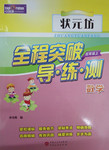题目内容
He failed the final examination and only then ____ how much time he had wasted.
A. he realized B. had he realized
C. he had realized D. did he realize
D
【解析】
试题分析:考查倒装句。句意:他期末考试不及格,并且只有在那时他才意识到他浪费了多少时间。题干中and后的分句使用的是“Only + 副词 + 助动词 +主语 + 动词 + 其他”的句型结构,语境是过去时,他意识到也是发生在过去,故选D。
考点:考查倒装句

练习册系列答案
 状元坊全程突破导练测系列答案
状元坊全程突破导练测系列答案 直通贵州名校周测月考直通名校系列答案
直通贵州名校周测月考直通名校系列答案
相关题目